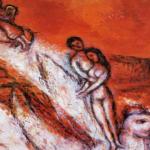Calum Carmichael is one of the most inventive biblical scholars around. He has made his career with studies of the interaction of narrative and law in the Old Testament, arguing, for instance, that the Levitical rules of consanguinity represent judgments on the practice of the patriarchs. It’s not entirely persuasive, but there are enough striking parallels between Leviticus 18 and the lives of the patriarchs in Genesis that I suspect Carmichael is on to something.
In The Sacrificial Laws of Leviticus and the Joseph Story, Carmichael sets out to justify his title: He claims that the early chapter of Leviticus don’t constitute a book of sacrificial procedures, nor a record of ancient Israelite worship, but are a literary creation that represent correctives and judgments on the story of Joseph in the latter part of Genesis.
It’s a counter-intuitive thesis and, I think, mistaken. But along the way to his erroneous conclusions Carmichael opens up some unexpected patterns in the tapestry of Torah.
He points to the parallel between the threat that Joseph’s brothers pose to Joseph and the threat that Pharaoh poses to Israel, and goes on to note multiple links between Moses and Joseph:
“Both Joseph and Moses become Egyptians with high status: the adult Joseph is elevated to Pharaoh’s top post in the government of Egypt and the infant Moses is adopted into the family of Pharaoh’s daughter. Joseph views himself as greatly superior to his brothers when living with them first in Canaan and then in Egypt [a questionable description – PJL]. In disguise and tormenting them, he makes them out to be spies in Egypt who should go to prison. The adult Moses’ fellow Israelites later complain about his assuming power over them when, after killing an Egyptian was beating a Hebrew, he intervenes in a physical fight between two fellow Hebrews. In each instance, because of their perceived arrogance, both Joseph and Moses are threatened with death. Each in turn is saved because they end up in a foreign country, Joseph in Egypt and Moses in Midian. Each marries a non-Israelite local woman, Joseph the daughter of an Egyptian priest (Gen 41:45) and Moses the daughter of a Midianite priest (Exod 2:16-21)” (16-7).
He finds a parallel between Joseph’s pretense of speaking through an interpreter and Moses’ reluctance to speak to the Israelite because of his “uncircumcised lips” (Exodus 6:12). Carmichael takes the latter as as Moses’ inability to speak Hebrew (17). He notes the link between the blood of the goat that Joseph’s brothers offer as evidence of his death and the blood of the Passover lamb (17-8).
Carmichael’s discussion of the parallel between the golden calf and the fall of Adam is illuminating. Both, he notes, involve “wrongful eating.” Adam and Eve eat and realize they are naked, which he links with the reveling and dancing at the calf. Most importantly, both Adam’s sin and the worship of the cal end with a “judicial-like enquiry”:
“Yahweh questions Adam and Eve about the offense of eating from the forbidden tree, and Moses questions Aaron about his culpability for making the Golden Calf. In each instance the party examined attempts to evade responsibility for the misdeed. Adam directs attention away from himself to Eve and Eve from herself to the serpent. Aaron, in turn, directs attention away from himself to the people. . . . In Genesis, the Cherubim in Eden wield a sword that threatens anyone seeking to return to the bountifulness of the garden and to partake of the tree of life. At Sinai, the Levites . . . slay with the sword some 3,000 offenders, thereby denying them life in the future in the bountiful land of Israel. In Gen 1-4:26, the narration of the story of Adam and Eve follows the narration of God creating the world in six days and resting on the seventh, the Sabbath. In Exod 32, the narration of the story of the Gold Calf follows immediately a command in Exod 31:17 to observe the Sabbath day” (24-25).
All this comports with the flow of Exodus 25-31, which describe the tabernacle in a series of seven speeches that culminate in the Sabbath command. A “fall story” fits very neatly.
I offer these quotations as examples of the fruitfulness of Carmichael’s approach, arresting when successful. His effort to link the Joseph narrative with the Levitical sacrifices isn’t successful, largely because he takes Joseph’s actions in Egypt as sinful and idolatrous. Joseph makes himself a god, dreams that his brothers will pay tribute to him, is the center of attention during his brother’s meal in the wilderness.
Leviticus pronounces a negative judgment on each of these incidents. The ascension offering is made to Yahweh, and is thus a negative judgment against Joseph’s supposed self-idolization. The grain/tribute offering (Leviticus 2) offers a rebuttal to Joseph’s idolatrous dream in which his brothers are pictured as sheafs of grain bowing to Joseph. The peace offering poses a harmonious feast over-against the strife-filled meals of Genesis.
It works only if Joseph does in fact claim divine status, only if his dream was wicked. But Carmichael’s arguments for those conclusions are thin. For instance, in Joseph’s dreams, the sheafs and stars representing his brothers bow down to him. The verb “occurs mainly in cultic contexts” (47). True, but so what? It can also occur in political contexts, when people, quite properly, offer obeisance to human kings who represent the divine King.
Somewhat more strongly, he points to Genesis 45:18, where Joseph is described as “father to Pharaoh” “answerable only to Pharaoh, the supreme ruler of Egypt who has the status of a god” (53). He quotes Von Rad’s commend that Joseph could not have ascended to this position “without . . . being placed within the protective sphere of an Egyptian deity” (53), but the text says the opposite: Egypt’s “god” is placed under the protective guidance of a son of Israel. Joseph becomes a “god of Egypt’s god,” much as Moses later becomes a “god” to Pharaoh (Exodus 7:1).
Nothing in Genesis or Exodus indicates that this is a bad thing. On the contrary, it’s all to the good that Pharaoh is answerable to a paternal Israelite god like Joseph, then accountable to the judicial Israelite god Moses.
Leviticus 1-3, then, isn’t correcting Joseph’s conduct. Is it perhaps tracking the Joseph narrative more positively? That may be the case. The ascension (not “whole burnt”) offering takes the worship through sword and fire into the presence of God; the worshiper who offers an ascension is not simply “forgiven” but glorified and united to the divine cloud and fire. Joseph’s elevation to take a throne next to Pharaoh is a historical analogue to the movement of the ascension ritual.
Leviticus 2 describes the grain or tribute offering, and marks a striking parallel with the tribute that Joseph’s brothers bring to Joseph. In his dream, they are tribute offerings, bowing to the sheaf of Joseph, the sheaf that feeds Egypt and the world. Thus, the sequence from ascension to tribute roughly follows the sequence of the Joseph narrative.
The peace offering then corresponds to the meal that Joseph and his brothers share in Egypt. It is a meal of reconciliation. Carmichael notes that the meal of Joseph’s brothers in Genesis 37 is “the first meal we ever hear about in the nascent nation’s history,” and during the meal they plot fratricide (57). The peace offering is a counterpoint, an opportunity for Israel’s children to congregate “amicably,” to express their “harmony and friendship” (57).
If there is something to these parallels, what do they tell us about the sacrificial system? Levitical sacrifice provides a way to relive the exodus ritually, the ascent from Egypt to Sinai’s covenant feast. But that exodus is prefigured in Joseph’s experience, his ascent from the pit to Egypt’s throne, to receive the tribute of his brothers, to eat and drink in a meal of reconciliation.
And this sacrificial/narrative sequence together prefigures the ascent of the greater Joseph from the grave to His Father’s throne, where He welcomes His brothers to a feast of the new covenant.











